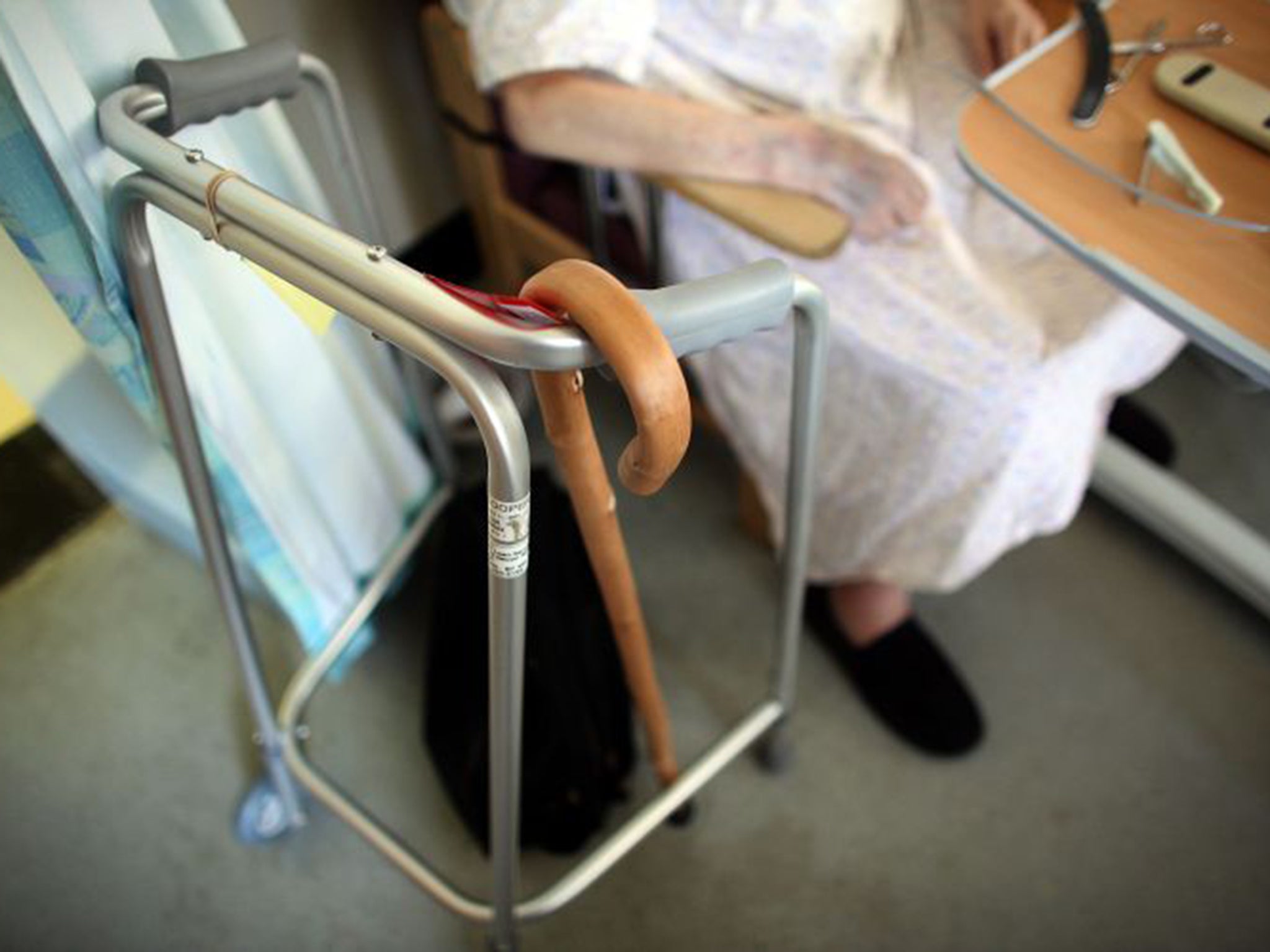A million elderly people lack basic social care as unprecedented funding cuts leave struggling NHS to pick up the pieces
Age UK say the issue is the single most important for older voters going into next month's general election

The number of elderly people who need help with basic tasks, but have been left to struggle by an unprecedented withdrawal of state-funded social care, has hit one million, experts believe.
The leading charity Age UK estimated last year that 900,000 people in England between the age of 65 and 89 have unmet social care needs, but experts at the charity now believe the figure is closer to one million.
Caroline Abrahams, Age UK’s chief executive, said that the issue of social care was the single most important issue for elderly voters going into next month’s election. But she warned it was not being talked about enough and had been put in “the too-difficult box” by politicians.
The reason for that, Ms Abrahams said, was, in part, because most of the current crop of top politicians may be “too young” to have seen the impact of social care cuts on their own parents.
Forty per cent cuts to government funding for local councils, which provide the bulk of social care, have had a devastating impact on elderly people, leaving hundreds of thousands struggling with basic tasks.

New figures from Age UK reveal that more than 250,000 people who would qualify for help in the home because of difficulty getting up and down stairs are getting no support.
Figures released by the charity in January show that 500,000 who need help with washing get no support, and nearly 600,000 who require assistance with dressing are struggling alone.
The full extent of the state withdrawal of social care services is revealed in official figures from the Health and Social Care Information Centre (HSCIC), which show that 10,600 council jobs in adult social care – 8 per cent of the total workforce – were lost in just one year between 2013 and 2014. The figure has been decreasing at a steady rate of 10,000 a year since 2011, though this does not include those working for charities or private companies.
Ms Abrahams, who leads Britain’s largest charity representing older people, told The Independent on Sunday, that the state was “running very fast in the opposite direction from older people”.
“For them, this is a real personal disaster,” she said. “That pushes burdens on to families and it’s not good for the NHS either.
“The importance of good social care really hits home when it touches you or those closest to you. From that point of view, it is notable that many of our leading politicians are only in their forties so they are probably too young to be seeing the huge value of social care for themselves.
“But in 10 years’ time it is likely that many of them will be worrying about mum or dad’s capacity to cope as they become frailer and trying to see if they can get home to help as part of their busy working lives.”
The disinvestment in social care, which has had more than £1bn pulled out of the sector since 2011, is viewed by critics as a false economy, because the burden of caring for elderly people shifts to the NHS.
Hospital admissions are rising fast with 15.5 million patients admitted into a hospital bed during 2013-14 – 870 more every day than in the previous year. Admissions of patients aged between 65 and 69 – often on the cusp of requiring more intensive care and support – increased at the fastest rate, by 5.5 per cent.
Trips and falls, which can often be prevented with social care support, accounted for 421,848 admissions, according to the HSCIC, up by more than 10,000 on last year, with the elderly by far the most likely to be taken to hospital for this reason.
A lack of social care provision also contributes to delays in moving elderly patients on from hospital. According to an analysis by the Health Service Journal, there were 375,700 such delayed transfers of care over the winter – up by an unprecedented 23 per cent on last year.
Many experts view this as the leading cause for overcrowding and long waits at A&E departments, and fear that cuts to social care could be to blame.
Gary Porter, leader of the Conservative group in the Local Government Association but giving his personal views, said politicians in government had now admitted there was a crisis in social care – and understood that councils are not at fault for causing it because they do not have the funds to help. “There is an acceptance of it nationally,” he said. “When all the delays in A&E would be kicking off and that was a live subject around the cabinet table, we were able to give lots of evidence to defend local government. It looked like we were going to be scapegoated.”
Age UK estimates that it would cost £3.36bn – only 0.22 per cent of English GDP – to meet the needs of all elderly people with moderate care requirements. Ms Abrahams said that decisions made about NHS and social care funding in the first spending review after the election could have “really profound” consequences for the future of elderly care.
“We’re not talking about it enough at this election,” she said. “It’s the single issue affecting older people where you can most see something needs to be done. And it’s quite obvious what needs to happen, which is, along with some reform, that more money needs to go into the system.”
Join our commenting forum
Join thought-provoking conversations, follow other Independent readers and see their replies
Comments
Bookmark popover
Removed from bookmarks